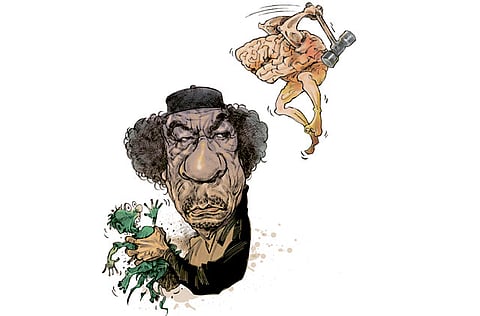Clever brains, not smart bombs
Winning the Libyan people's confidence and exposing Gaddafi's lies is crucial

Air power alone won't rid the Libyan people of their stubborn dictator who's vowed to hang on until the last drop of his — and everyone else's — blood. And there's little appetite among the members of Nato or the Arab League to insert foreign boots on the ground.
Moreover, Nato plans to strictly adhere to the remit of UNSC 1973 now that it is officially in charge — the protection of civilians. This could leave rebel offensives on cities without air cover.
Travel bans and the freezing of Muammar Gaddafi's assets won't do the trick either in the short-to-medium term. With words like ‘quagmire' and ‘stalemate' being bandied around there's an urgent need for a fresh approach.
The longer this goes on, the coalition's resolve is likely to crack. US President Barack Obama with the albatrosses of Iraq and Afghanistan around his neck is an unwilling war president. More crucially, he doesn't want to spoil his re-election chances by getting bogged down in another unpopular far-flung conflict.
Republican Senator Lindsay Graham has slammed him for handing over the mission to Nato instead of maintaining US leadership of "the free world". Editor of the right-wing Weekly Standard Bill Kristol has called the Obama's handling of the Libyan crisis "humiliating". The left has been equally scathing.
Democratic Rep Dennis Kucinich is trying to have Obama impeached for authorising air strikes on Libya without first gaining Congressional approval. Likewise, British Prime Minister David Cameron may not be quite so gung-ho over Libya after last weekend when up to 300,000 demonstrators swarmed over London protesting harsh job and benefits cuts.
Okay, so there's an effective no-fly zone in place over Libya and when pro-Gaddafi tanks get too close to civilian population centres they end up charred. It's true that the courageous rag-tag rebel army has received a massive shot in the arm from the international military intervention just when their resolve to push west was flagging.
As of Sunday, they had retaken the town of Ajdabiya, the oil ports of Brega and Ras Lanuf and were advancing on Gaddafi's place of birth Sirte. But what happens next?
Challenges
The revolutionaries know that they must take Tripoli to keep Libya from splitting into two separate entities. But that's no easy task when even before they reach the capital they must first subdue Sirte, a loyal pro-regime stronghold.
Furthermore, as long as western reporters in Tripoli are banned from leaving their hotels without minders, nobody can gauge how much support the Libyan leader retains among the capital's two million population.
So what can be done in addition to military action?
The coalition should find a way to get their message across to the Libyan people in the west of the country at a time when satellite networks are being blocked and internet access interrupted. At present Gaddafi is being allowed to win the propaganda war.
Most ordinary Libyans are getting their news from Libyan State TV which is exaggerating civilian casualties, portraying the international intervention as a "crusader" oil-grab and has even characterised Saturday's demonstration in London as an anti-no-fly zone protest.
The people of Tripoli wouldn't have had a chance to witness the disgraceful way a distraught young woman was treated by state security. When she tried to tell western journalists having breakfast in their hotel that she had been detained, attacked and raped by Gaddafi militiamen, she was manhandled and bundled into a car. Journalists who tried to protect her were thrown to the floor and kicked, their cameras broken.
In this case, what's to stop the US from silencing State TV broadcasts using sophisticated jamming equipment.? Leaflets explaining that the allies have no intention of occupying the country or stealing its oil — with details of Gaddafi's looted assets in foreign banks and his crimes — could be dropped from planes.
Secondly, western intelligence services should find a way to contact Gaddafi's generals, perhaps via intermediaries, with an offer they can't refuse to include immunity from prosecution in the International Criminal Court and a lump sum with which to re-start their lives.
Third, Gaddafi's foreign mercenaries should be given a window of opportunity to leave the country through Tunisia or Egypt without fear of repercussions, else risk prosecution and long prison sentences.
Finally, Gaddafi and his family should be offered safe passage to any country that is prepared to take them in, such as Venezuela or Zimbabwe. The main priority is the safety of civilians and not retribution. Cornering this madman who may have stocks of biological or chemical weapons and who has threatened to burn Libyan oilfields is a bad idea.
His assassination should not be an option either because it is not only unethical it would also turn him into a revered martyr in some sections of society, which is exactly what he wants.
Whatever strategies are employed, for the sake of the Libyan people, Gaddafi cannot be allowed to stay. With this discredited and dangerous wounded beast, their future will be bleak. And, as Cameron has warned, if his regime survives it could exact terrorist reprisals on Britain and other coalition countries.
Coalition partners are coy when asked about ‘regime change'. But if that's what's required to free Libya clever brains are worth more than smart bombs.
Linda S. Heard is a specialist writer on Middle East affairs. She can be contacted at lheard@gulfnews.com.



